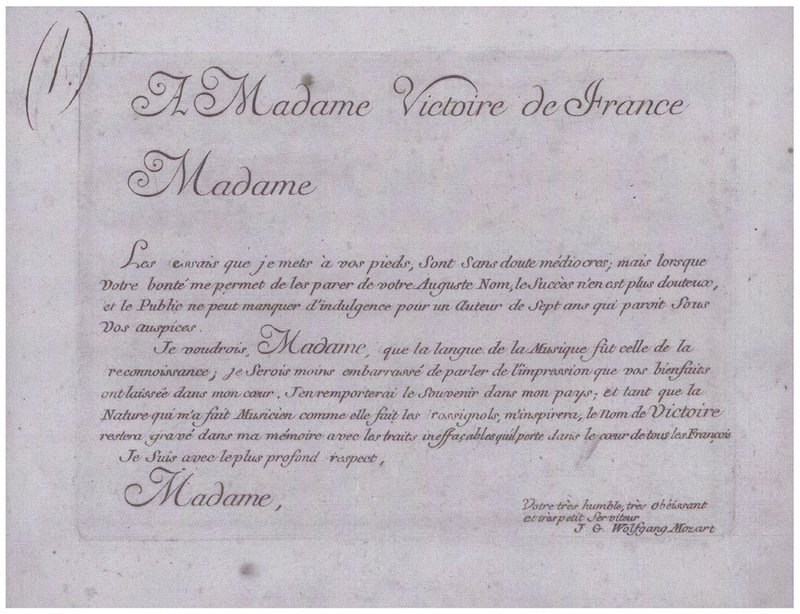Sonatas for keyboard with optional violin accompaniment (K6-7) and sonatas for keyboard with violin accompaniment (K8-9). K6-7, published as opus I, were composed between 1762 and 1764, in Salzburg, Brussels and Paris. K8-9 were composed in Paris in late 1763 and early 1764. The Allegro of K8 is dated 21 November 1763. Published as opus I and opus II in the spring of 1764, they were dedicated to Madame Victoire, daughter of Louis XV of France, and Adrienne Catherine de Noailles, Comtesse de Tessé, respectively.
Leopold Mozart first mentions the sonatas K6-10 in a letter written at Paris on 1 February 1764:
- At present four sonatas of M. Wolfgang Mozart are being engraved. Imagine the fuorore they will make in the world when people read on the title-page that they have been composed by a seven-year-old child.’ On 22 February he wrote: ‘The Duc d’Ayen has arranged that in a fortnight at the latest we shall drive out again to Versailles, in order that we may present to Madame Victoire, the King’s second daughter, to whom it has been dedicated, the oeuvre Ier of the engraved sonatas of the great M. Wolfgang. The oeuvre 2e will be dedicated, I think, to Madame la Comtesse de Tessé.
When he finally sent copies of the printed editions to Salzburg, he wrote, on 3 December to Johann Lorenz Hagenauer:
- I regret that a few mistakes have remained in the engraving, even after the corrections were made. The woman who engraved them and I were at too great a distance and as everything was done hurriedly, I had no time to obtain a revised proof. That is the reason why especially in oeuvre IIe in the last trio you will find three consecutive fifths in the violin part, which my young man perpetrated and which, although I corrected, them, old Madame Vendôme left in. On the other hand, they are a proof that our little Wolfgang composed them himself, which, perhaps quite naturally, not everyone will believe.

W A Mozart, Dedication of sonatas K6-7 (Paris, 1764)
The dedication of K6-7 to Madame Victoire reads:
- The attempts I lay before your feet are not doubt mediocre; but since Your goodness permits me to adorn them with Your August Name, their success is in no further doubt, and the Public cannot fail to exercise indulgence for their seven-year-old author since he appears under Your auspices.
- I could wish, Madame, that the language of Music were that of gratitude; I should then be less embarrassed in speaking of the impression which Your benefits have left on my heart. I shall carry their remembrance to my country; and so long as Nature, who has made me a Musician as she makes the nightingales, shall inspire me, the name of Victoire shall remain engraved on my memory with the same ineffaceable strokes which mark it upon the hearts of the French nation.
- I am, with the most profound respect,
- Madame,
- Your very humble, very obedient and very small Servant,
- J. G. Wolfgang Mozart
The dedication of K8-9 reads:
- Madame, Your taste for Music and the kindnesses with which you have loaded me entitle me to devote my feeble talents to You. But since You accept their homage, is it possible that You will forbid a Child the expression of the sentiments of which his heart is full?
- You do not wish me, Madame, to say of You what all the Public says. This severity will diminish the regret I feel in leaving France. If I no longer have the happiness of complimenting You, I am going to a country where at least I may speak as much as I shall wish, both of what You are and of what I owe to You.
- I am, with the most profound respect,
- Madame,
- Your very humble and very obedient little servant,
- J. G. Wolfgang Mozart.
It is likely that both dedications were written by Friedrich Melchior, Baron von Grimm, the journalist, diplomat and contributor to Diderot and D’Alembert’s Encyclopédie, who was the Mozarts’ chief patron in Paris.
- Mozart Relevance
-
- Category/Role
- Chamber music
- Author/Creator
- Mozart, Wolfgang Amadeus (1756-1791)
- Date 1
- 1762
- Date 2
- 1764
- Location
- Paris (mostly)